Back to Blog Home
How to start a staffing agency in 7 steps (with examples)

Finding good talent is way harder than you might think.
Many companies struggle to find people who really know their business and are world-class in what they do. And with any problem comes an opportunity to create a solution.
That’s where you come in.
If you consider yourself someone who gets joy out of connecting people together and helping close gaps in their lives, learning how to start a staffing agency can be a fruitful venture. A venture where you're not just making a lot of money, but also helping people land their dream jobs.
In this article, I’ll show you how to start a staffing agency in seven steps. We’ll also look at some examples of real staffing agencies out in the wild so you can gain inspiration for your own.
Okay, let’s get into it.
What is a staffing agency?
A staffing agency acts as a mediator between employers and job seekers, pairing up organizations in need of employees who fit their roles and responsibilities. But it's not just about finding filling roles — it's all about connecting companies with top talent.
The idea is simple: businesses need skilled workers and people are looking for jobs that suit their skills. This gives rise to the question — who can bridge this gap? That’s where staffing agencies come into play.
These agencies have a twofold mission: helping employers find suitable candidates and aiding job seekers in landing positions that fit their skill sets.
Different types of staffing agencies
Temporary: These help companies fill temporary vacancies, perhaps due to employee absences or seasonal workloads.
Long-term: They assist businesses seeking employees for long-term contracts or indefinite periods.
Niche-specific: Niche-specific ones focus on specific industries such as IT, healthcare, legal services, etc., making them more adept at understanding industry trends and requirements.
The role of a staffing agency
The first step involves taking note of a company’s hiring needs. The process isn’t just restricted to filling vacant positions but also understanding company culture to ensure they find individuals who would be the perfect fit.
In addition to serving businesses, these agencies provide career guidance for those hunting for jobs — whether it's crafting compelling resumes or preparing for interviews.
7 steps to starting a staffing agency in 2024
Here are seven steps to start your staffing agency:
- Find your niche
- Legal setup and compliance
- Financing your staffing agency
- Set up operations and workflows
- Use Copilot to manage clients and finances
- Build your team
- Market and brand your staffing agency
Okay, let’s dive deeper into each one!
1. Find your niche
Starting a staffing agency is like setting sail on an ocean of opportunities. But, to navigate these waters effectively, you need a compass — that's where finding your niche comes in.
Think about it: would you rather be another small fish in the vast sea of generalist agencies or the go-to specialist in a smaller pond? It's more efficient and profitable to specialize than trying to cater to everyone.
The benefits of specializing
Determining what sets your agency apart from others gives potential clients a clear reason for choosing you over competitors. Your specialization could be anything from focusing on specific industries like healthcare or IT, or zeroing in on roles such as executives or temporary workers.
Besides standing out, specializing lets you develop deeper knowledge and expertise within your chosen area. This understanding helps when screening candidates because it better matches job seekers' and employers' needs.
Selecting your specialty
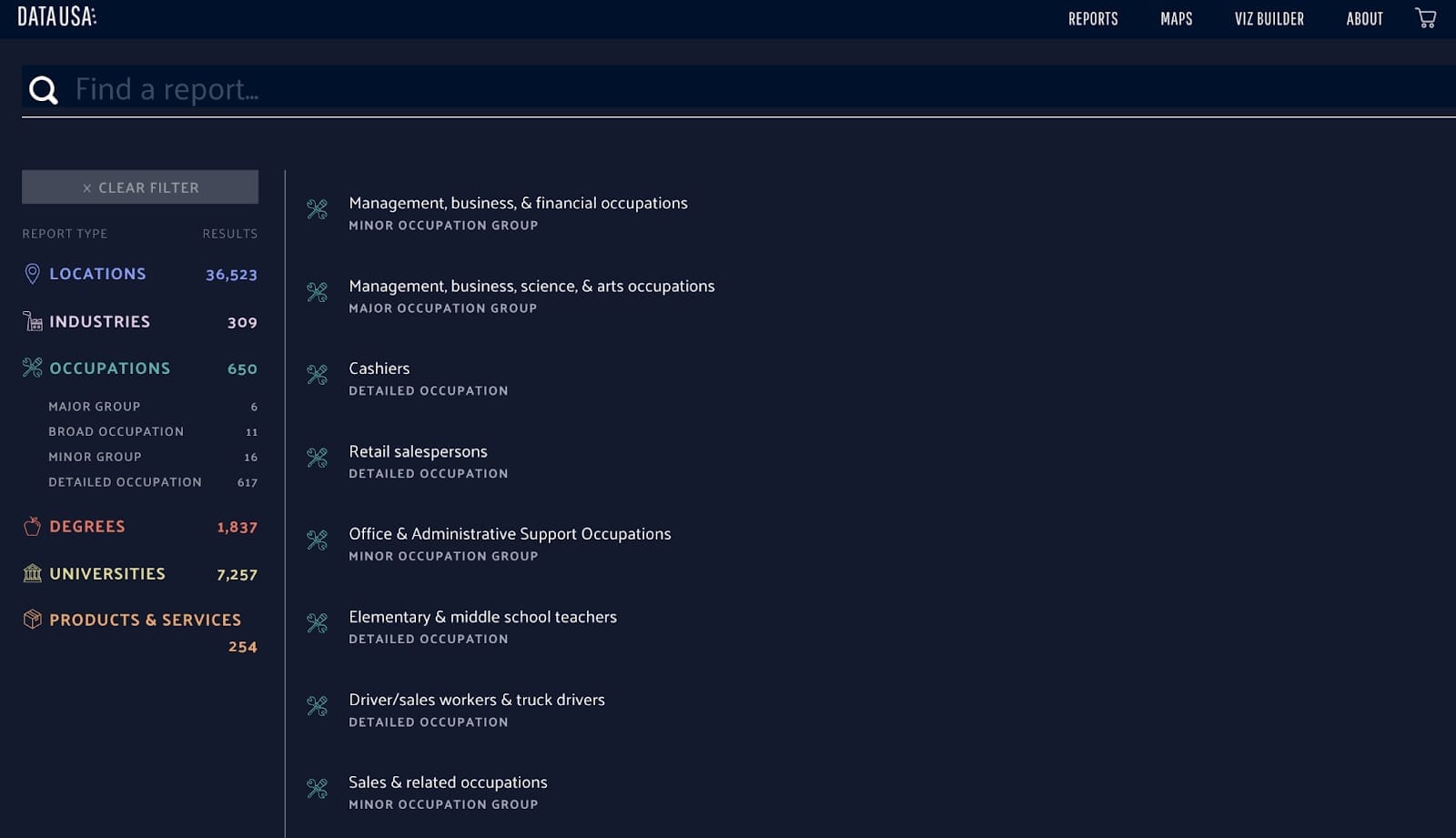
To select an ideal niche for yourself, consider factors such as market demand, competition levels, familiarity with the industry sector, existing connections/networks, etc. Analyze data from resources like Data USA, which provides comprehensive statistics about different sectors across America’s workforce landscape — this can help inform strategic decisions regarding specializations.
2. Legal setup and compliance
If you're about to start a staffing agency, it's not all just shaking hands and signing contracts. You've got some legal homework to do first. This usually means looking out for permits you may need depending on the niche you go into.
Necessary business licenses and permits
To kick off your journey, you'll need the right paperwork. This includes business registration, tax IDs, and necessary local or state licenses.
A quick chat with a lawyer can help clarify what exactly you need for your area. Remember that rules change from place to place.
Labor laws knowledge
You're stepping into the job market now, so getting cozy with labor laws is crucial. Know about things like overtime pay regulations or worker's rights in order to avoid costly missteps.
Insurance requirements
Risk management should be at the top of your list when starting any new venture but even more so in staffing where other people's careers are involved. Workers' compensation insurance might be required depending on your location.
Data protection considerations
In today’s digital world, data privacy matters… a lot. As an agency owner, safeguarding candidate information is essential. Look into the Privacy Shield Program. This program provides companies with guidance on how to protect personal data across borders while maintaining regulatory compliance.
This gives a brief overview of the kind of legal obligations one must meet before diving headfirst into running their own staffing firm.
3. Financing your staffing agency
You're about to start a journey, and like any great adventure, you'll need resources. Financing your staffing agency is no small task.
Your Personal Savings
Digging into personal savings is an option many entrepreneurs choose. It gives full control over finances but can be risky if the business doesn't take off as planned.
Bank loans
Banks offer various loans designed for startups. You could consider this route, but remember to thoroughly read the terms before signing anything.
SBA Loans
The U.S. Small Business Admin (SBA) has low-interest loans that are often simpler to be eligible for than standard bank credit lines.
Venture capitalists and angel investors
If you have an innovative idea or niche market strategy, venture capitalists or angel investors might be interested in financing your project. These sources come with their own pros and cons, so make sure you understand them well beforehand.
Crowdfunding platforms
Kickstarter, Indiegogo, and other crowdfunding platforms allow entrepreneurs to raise funds from a large number of people simultaneously. This way not only do you get funding but also early supporters who believe in your vision.
However, note that some of these crowdfunding platforms don’t allow software businesses, and are usually reversed to physical products. So double-check.
4. Set up operations and workflows
Starting a staffing agency? Great. Let's chat about configuring your business processes and activities. First things first, you need to choose where you'll be running the show from.
Picking your office location
You can either go traditional with an office location or take advantage of modern technology and run a remote operation. Both options have their perks.
Investing in technology & equipment
No matter where you decide to set up shop, some essentials are universal. You're going to need computers for sure.
The heart of any staffing agency is its staffing software. This will help manage clients' details, candidates' profiles, job orders, invoicing — pretty much everything.
Solid Communication tools are key
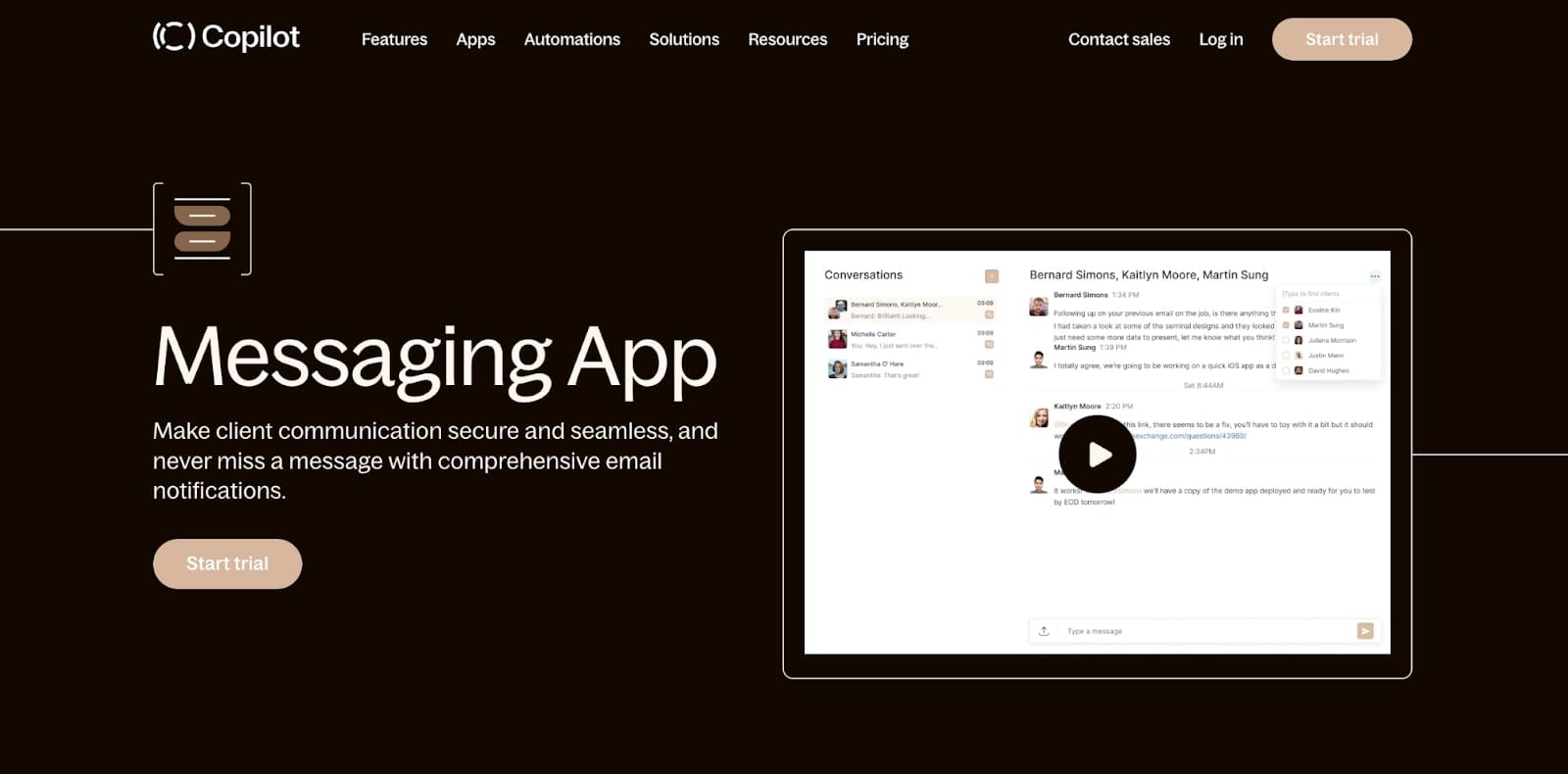
Your communication tools should include reliable email services (think Gmail or Outlook), and telecommunication applications like Copilot, Zoom, or Skype for video calls and meetings with clients/candidates.
Tailoring your workflow process
A well-structured workflow process helps streamline your daily tasks so that nothing slips through the cracks. Remember that there isn't a universal solution; the most effective approach will depend on your company's requirements and structure.
Here’s how you could tailor it for yourself.
5. Use Copilot to manage clients and finances
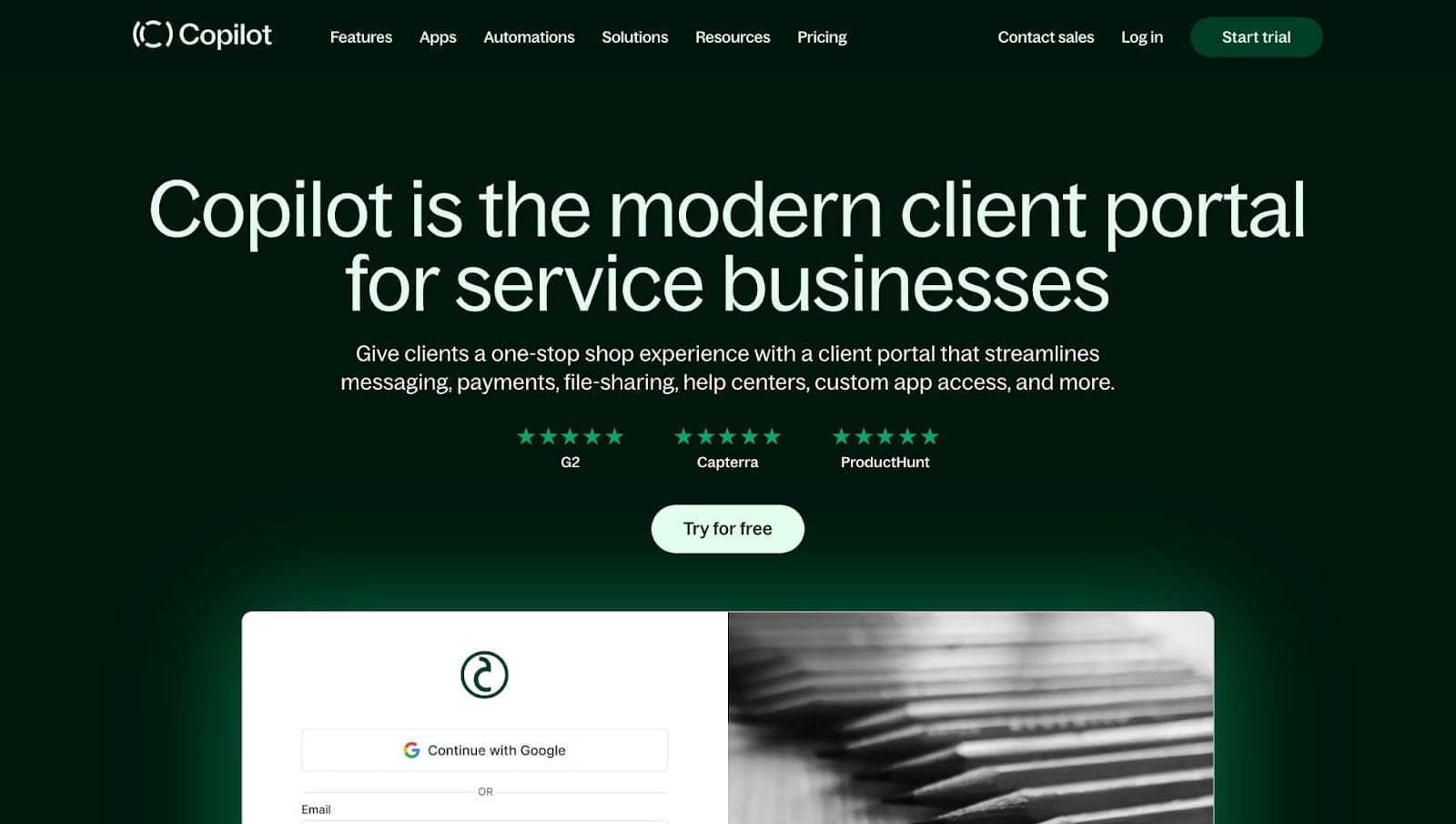
When it comes to managing clients and finances, Copilot is your go-to tool. Copilot is client portal software designed to revolutionize the way service-based businesses interact with their clients.
Tailored for a range of industries, Copilot simplifies and streamlines client management by offering a unified platform for communication, document sharing, billing, and project management. With features such as customizable client portals, automated invoicing, secure file sharing, and seamless integration with various tools, Copilot enhances client engagement while boosting efficiency and productivity.
Its user-friendly interface and flexible functionalities make it an ideal choice for businesses looking to provide a premium, organized, and professional service experience to their clients. Whether you're a small startup or an established enterprise, Copilot's versatile and robust platform is designed to adapt to your specific business needs, elevating the way you manage client interactions and operations.
Clients' management simplified with Copilot
No more juggling between different platforms. With Copilot, you get a streamlined way of handling all client interactions.
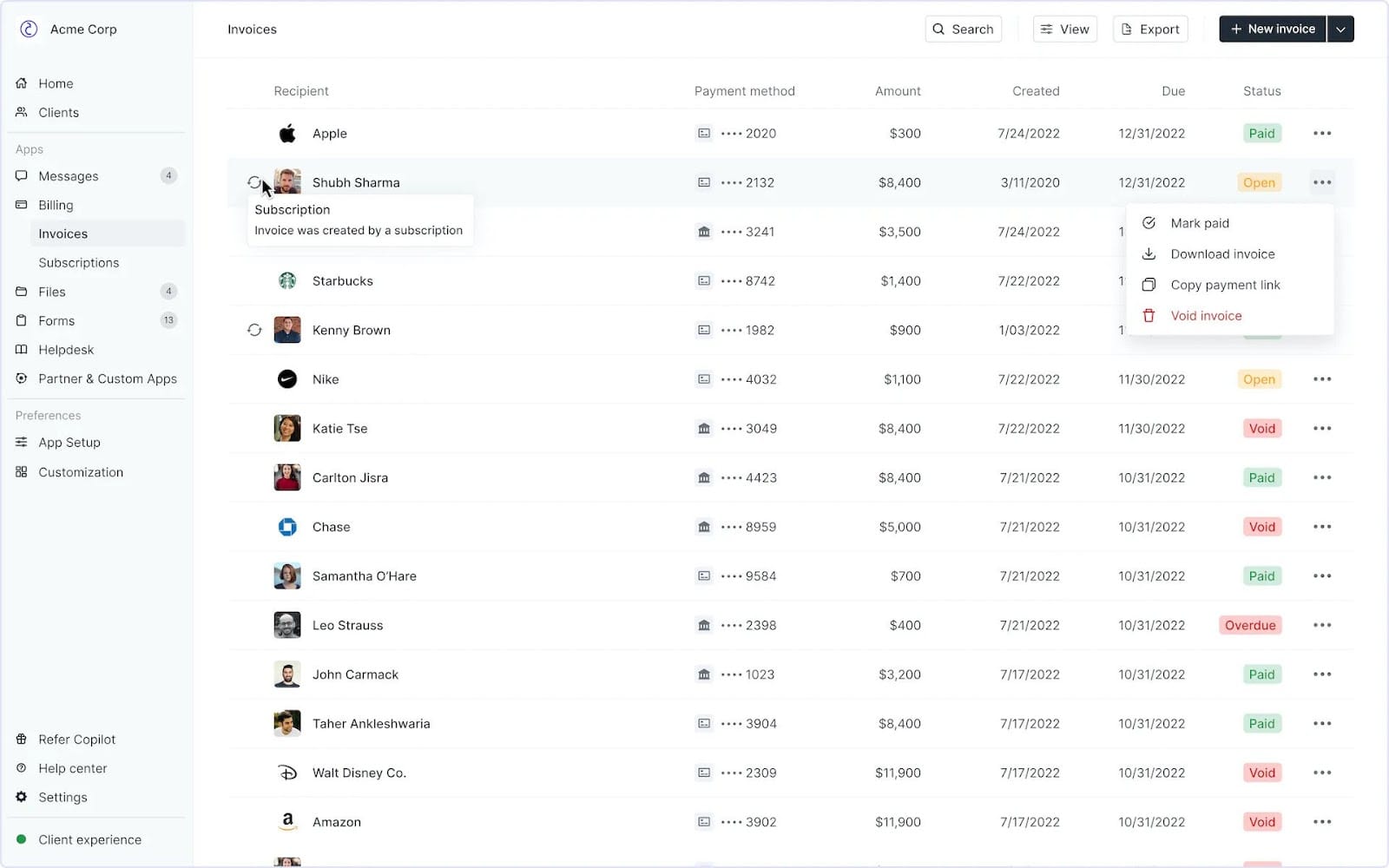
You can easily manage messaging, take care of file-sharing, answer questions in the help center, give access to custom apps, and much more. You can also use the app marketplace to integrate all of your other tools — giving you the ability to bring your entire tech stack under one roof.
A one-stop shop for financial management
Besides offering an efficient communication platform with your clients, Copilot also lets you handle financial aspects smoothly.
Invoicing becomes less daunting as you can quickly generate bills directly from the portal itself. You can also create recurring subscriptions, so you don’t to worry about constantly chasing down clients to get invoices paid.
The advantage of streamlined operations
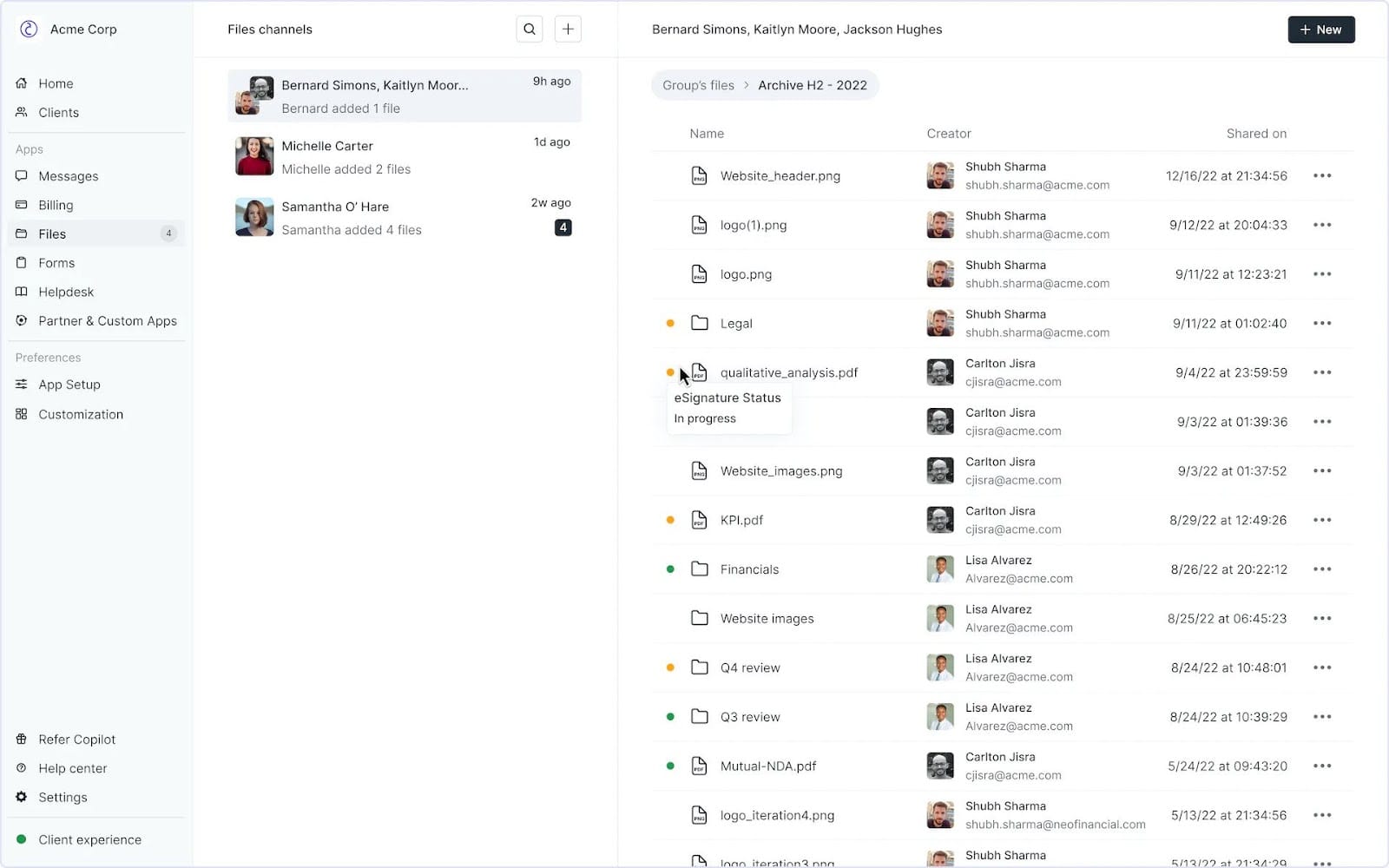
Maintaining a staffing agency requires keeping track of multiple moving parts at once. This is where having an all-in-one platform like Copilot proves beneficial.
You no longer need separate tools for document management — everything gets housed under one roof.
Note: If starting a staffing agency feels overwhelming due to the number of tasks involved; don't fret. Using tools like Copilot, which simplify operations by combining many functions into one place, will make sure that the process isn’t just doable but manageable too. Feel free to book a demo if you want to talk to a real person on our team.
6. Build your team
To kick off, you'll need to start building a strong and reliable team. Your agency's success depends heavily on the quality of recruiters you have.
Hiring recruiters
Start by hiring experienced recruiters who know how to scout for talent. Look for individuals with exceptional verbal communication aptitudes and a talent for connecting.
If budget is tight, consider training eager beginners. They can bring fresh ideas and are often willing to work hard to prove themselves.
Fostering relationships with clients
Your relationship with potential clients is equally important as having good candidates. So let's not neglect this part.
Regular check-ins, understanding their needs better than they do — that’s what will set you apart from competitors. Building trust leads to repeat business which in turn brings stability.
Sourcing candidates
The next step? Get yourself some top-notch candidates. How?
- Dig into various sourcing methods like job boards such as LinkedIn.
- Leverage social media platforms — they're teeming with talent waiting to be discovered.
You might also want to consider attending networking events or asking current employees for referrals.
Remember: A staffing agency thrives on its ability to match the right candidate with the right client.
7. Market and brand your staffing agency
Your brand is the face of your business. Crafting a distinct brand persona is what will make your staffing agency stand out from the competition.
Creating a unique brand identity
To start, ask yourself: What makes my staffing agency different? Is it our specialized niche or exceptional customer service?
This uniqueness becomes part of your brand identity, which should be reflected across all marketing channels — website, social media, and promotional materials.
Digital marketing strategies for staffing agencies
Digital marketing can help amplify your reach. Let's focus on content creation - providing value to both clients and candidates through informative blog posts or white papers.
Content marketing strategies not only improve SEO rankings but also establish credibility in the industry.
Social media for recruitment
Social media isn't just about posting jobs; it’s an opportunity to showcase company culture, share success stories, and engage with potential candidates.
Effective use of platforms like LinkedIn or Facebook can lead to increased visibility among job seekers and potential clients alike.
The role of Copilot in building your agency’s reputation
Copilot provides one-stop solutions that let you manage client interactions efficiently while keeping track of finances.
For example, if you have a website built on Wix, Squarespace, WordPress, or Webflow, or really any platform, you can easily integrate it with Copilot — allowing your clients to log in directly on your website and access their portal.
Making sure this efficiency reflects on every touchpoint will give confidence to clients choosing between multiple agencies.
Remember branding doesn’t happen overnight, but consistent effort will help build a strong reputation for your staffing agency.
3 examples of staffing agencies in 2024
Here are a few examples of real staffing agencies:
Let’s look at each staffing agency.
1. Artisan Talent
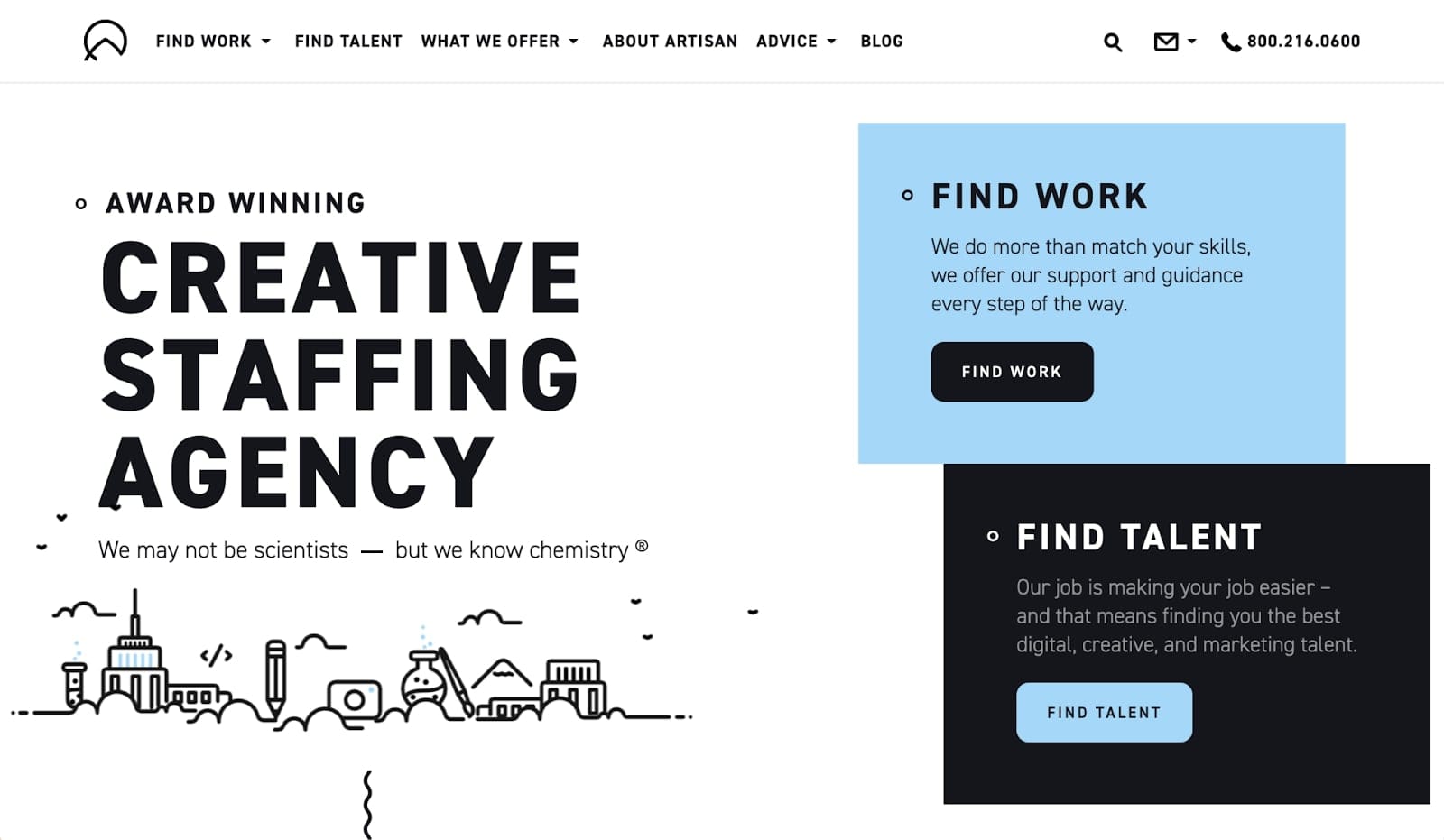
Artisan Talent is a creative staffing agency specializing in connecting talent with companies seeking design, marketing, and digital expertise. Their focus on the creative sector demonstrates the importance of targeting a specific market in the staffing industry.
With a clear understanding of startup costs and cash flow management, they have efficiently set up their business entity and office space to cater to a niche segment. Their success is a testament to the effectiveness of a well-thought-out marketing plan and recruitment process, making them a benchmark for new business owners aspiring to establish their own staffing agency.
2. SupportNinja
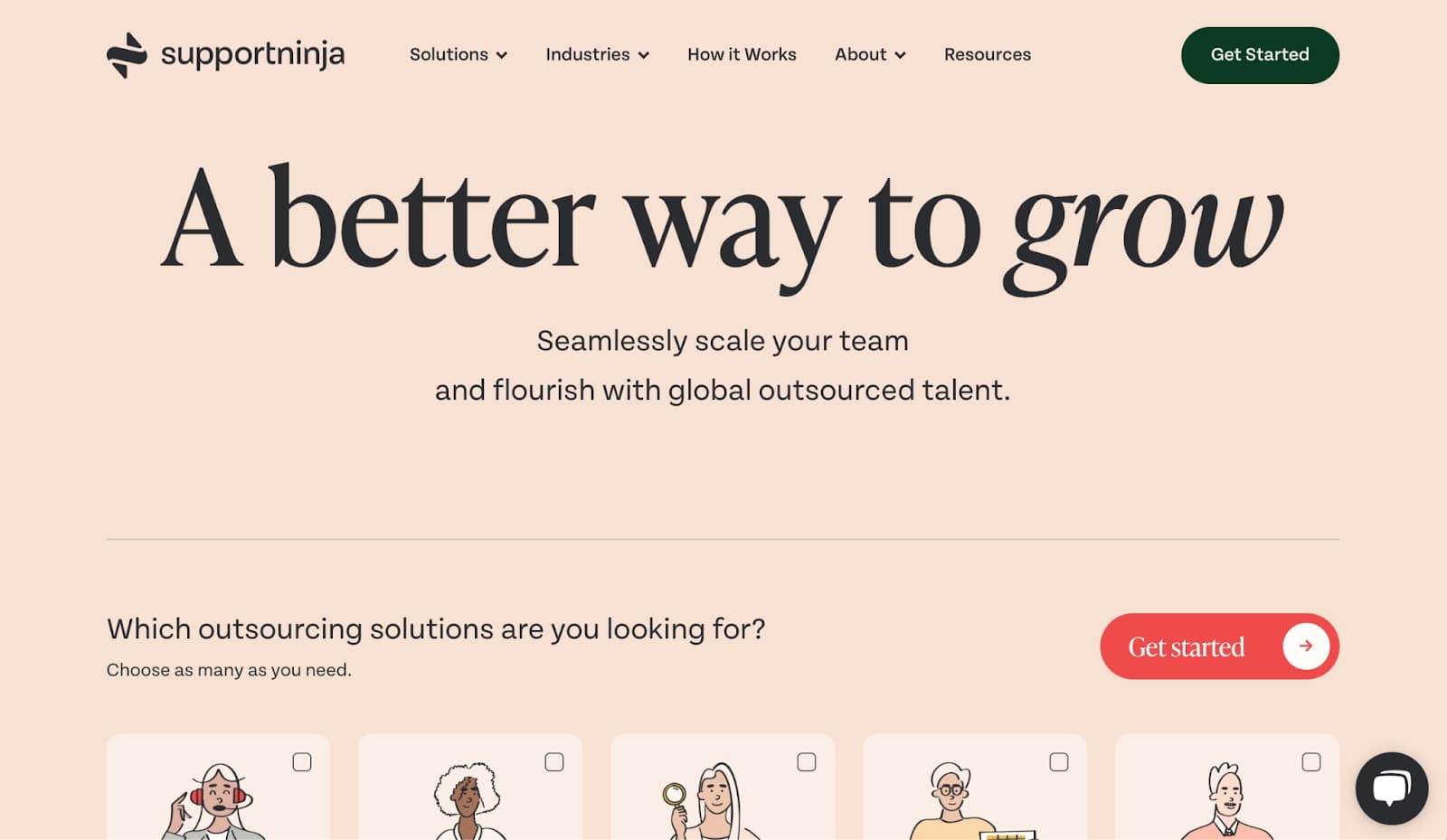
SupportNinja offers a unique blend of outsourcing and staffing services, particularly in customer support and back-office roles. They illustrate how a staffing business can expand beyond traditional employment agencies by incorporating innovative service models. This reflects the importance of understanding your target market's needs and tailoring your hiring process to meet those demands.
SupportNinja's growth also highlights the significance of pricing strategies and finding clients who value specialized services.
3. Insight Global
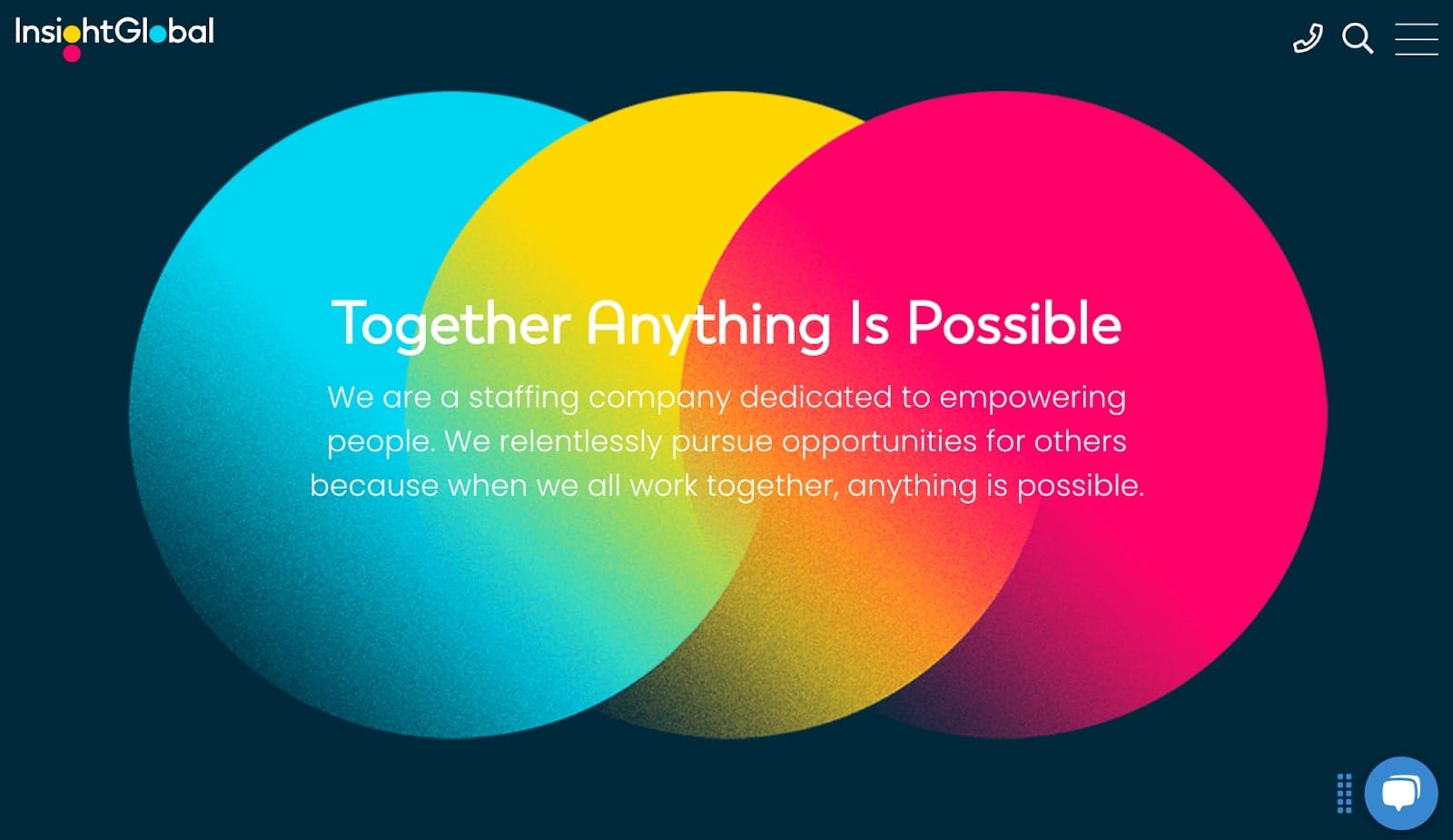
Insight Global is a broad-spectrum staffing agency that has made significant strides in IT, government, finance, and healthcare sectors. Their expansive reach demonstrates the potential scalability of a staffing business when the business model is built on a solid foundation of effective staffing and recruitment processes.
Insight Global’s success underscores the importance of a streamlined hiring process and efficient client-finding techniques in the competitive world of staffing agencies.
In all these recruiting agency examples, the common thread is the strategic approach to business planning, understanding the target market, and efficient operational execution. Aspiring business owners can learn from these models and consider integrating tools like Copilot to manage business operations, streamline the recruitment process, and maintain a healthy cash flow, thereby laying a strong foundation for a successful staffing agency.
Is owning a staffing agency profitable?
Let's get straight to the point. Starting a staffing agency can indeed be quite lucrative.
You're probably asking, "But how much could I potentially earn?" That largely depends on your business model and sector focus. According to Staffing Industry Analysts, US staffing companies generated over $212.8 billion in revenue in 2022.
A single successful placement can net anywhere from 25% to 100% of the candidate's first-year salary as commission. So if you place a candidate with an annual pay of $60,000, that means up to $60k goes into your pocket. Of course, this is before operating expenses are deducted.
Finding your sweet spot
The profitability also hinges on finding your niche within the industry. Specialized sectors like IT or healthcare often have higher margins compared to general administrative roles due to demand-supply dynamics.
Manage costs effectively
To keep profits high though, it's crucial you manage operational costs effectively. The biggest expense? Often it’s salaries for internal staff who do everything from recruitment to sales and support services. You'll need smart financial planning here. Luckily, tools like Copilot come in handy for managing finances efficiently.
Growth potential: Franchising or going solo?
If growth is what you’re after, consider franchising versus going solo which has its own set of pros and cons. However, both offer different pathways towards profitability depending upon one’s entrepreneurial appetite.
So, to sum it up: owning a staffing agency can be profitable. But remember — profitability comes from the right mix of sector focus, cost management, and growth strategy.
Conclusion
Stepping into the staffing agency world is no small feat, but with this guide on how to start a staffing agency, you're well-equipped.
Identifying your niche in the market — that's essential. You've got tools and techniques for crafting an effective business plan too.
Tackling legal considerations and securing finances won't scare you anymore. Plus, setting up operations and workflows? You're covered!
You learned about using Copilot for managing clients and finances seamlessly. Building your team now seems less daunting as we explored sourcing methods like job boards, networking events, or referrals.
Your marketing game will be strong because we delved deep into digital marketing strategies that work wonders. So, here's to profitable ventures in the staffing industry!
Share this post
Sign up for our newsletter
Subscribe to our newsletter to receive emails about important announcements, product updates, and guides relevant to your industry.
